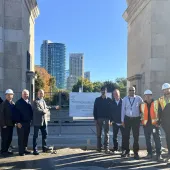Cemex develops Biodiversity Net Gain service for developers
Cemex UK has launched a new Biodiversity Net Gain (BNG) service aimed at helping developers meet their legal obligations under updated planning regulations. The service builds on Cemex’s decades of experience in land restoration and biodiversity enhancement at quarry sites across the country.
BNG, now a condition of planning permission in England, requires new developments to achieve a minimum 10% increase in biodiversity value, measured against a baseline established before any work begins. Developers must also show that biodiversity gains can be maintained for at least 30 years.
Cemex’s new offering supports clients throughout this complex process—from baseline assessments and habitat unit calculations to long-term management and monitoring plans. It also provides access to surplus biodiversity credits from Cemex’s portfolio of restored land, which can be used by developers unable to achieve the 10% target on-site.
Steve Redwood, land development and property director at Cemex, said: “Our Biodiversity Net Gain offering can help organisations who are new to biodiversity enhancement projects, those who may not have the in-house skills or knowledge, and companies working with sites where biodiversity net gain targets will be difficult or costly to achieve.”
The service is designed to help clients avoid costly delays and ensure full compliance with the BNG framework, which is now embedded in local planning authority requirements.
Cemex is well established in the UK concrete and aggregates sector and has delivered large-scale habitat creation at sites including Kensworth Quarry in Bedfordshire. The company says its approach enables a “hassle-free” route to meeting biodiversity targets and supports wider industry efforts to reduce environmental impact.







